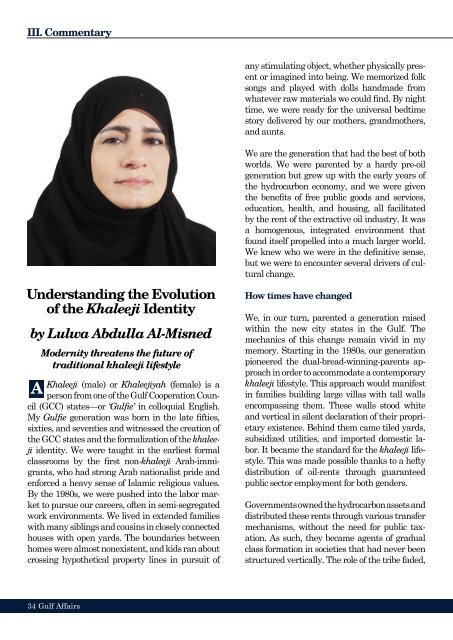You also want an ePaper? Increase the reach of your titles
YUMPU automatically turns print PDFs into web optimized ePapers that Google loves.
III. Commentary<br />
any stimulating object, whether physically present<br />
or imagined into being. We memorized folk<br />
songs and played with dolls handmade from<br />
whatever raw materials we could find. By night<br />
time, we were ready for the universal bedtime<br />
story delivered by our mothers, grandmothers,<br />
and aunts.<br />
Understanding the Evolution<br />
of the Khaleeji <strong>Identity</strong><br />
by Lulwa Abdulla Al-Misned<br />
A<br />
Modernity threatens the future of<br />
traditional khaleeji lifestyle<br />
Khaleeji (male) or Khaleejiyah (female) is a<br />
person from one of the Gulf Cooperation Council<br />
(GCC) states—or ‘Gulfie’ in colloquial English.<br />
My Gulfie generation was born in the late fifties,<br />
sixties, and seventies and witnessed the creation of<br />
the GCC states and the formalization of the khaleeji<br />
identity. We were taught in the earliest formal<br />
classrooms by the first non-khaleeji Arab-immigrants,<br />
who had strong Arab nationalist pride and<br />
enforced a heavy sense of Islamic religious values.<br />
By the 1980s, we were pushed into the labor market<br />
to pursue our careers, often in semi-segregated<br />
work environments. We lived in extended families<br />
with many siblings and cousins in closely connected<br />
houses with open yards. The boundaries between<br />
homes were almost nonexistent, and kids ran about<br />
crossing hypothetical property lines in pursuit of<br />
We are the generation that had the best of both<br />
worlds. We were parented by a hardy pre-oil<br />
generation but grew up with the early years of<br />
the hydrocarbon economy, and we were given<br />
the benefits of free public goods and services,<br />
education, health, and housing, all facilitated<br />
by the rent of the extractive oil industry. It was<br />
a homogenous, integrated environment that<br />
found itself propelled into a much larger world.<br />
We knew who we were in the definitive sense,<br />
but we were to encounter several drivers of cultural<br />
change.<br />
How times have changed<br />
We, in our turn, parented a generation raised<br />
within the new city states in the Gulf. The<br />
mechanics of this change remain vivid in my<br />
memory. Starting in the 1980s, our generation<br />
pioneered the dual-bread-winning-parents approach<br />
in order to accommodate a contemporary<br />
khaleeji lifestyle. This approach would manifest<br />
in families building large villas with tall walls<br />
encompassing them. These walls stood white<br />
and vertical in silent declaration of their proprietary<br />
existence. Behind them came tiled yards,<br />
subsidized utilities, and imported domestic labor.<br />
It became the standard for the khaleeji lifestyle.<br />
This was made possible thanks to a hefty<br />
distribution of oil-rents through guaranteed<br />
public sector employment for both genders.<br />
Governments owned the hydrocarbon assets and<br />
distributed these rents through various transfer<br />
mechanisms, without the need for public taxation.<br />
As such, they became agents of gradual<br />
class formation in societies that had never been<br />
structured vertically. The role of the tribe faded,<br />
34 Gulf Affairs


